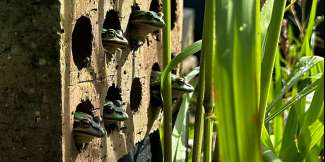Weekly recaps

Recap / Best of Last Week—Earth may have had rings, an improved nuclear battery, a new approach to defibrillation
It was a good week for space science, as a trio of Earth scientists at Monash University found evidence that Earth may have had a ring system 466 million years ago—in studying plate tectonics during the Ordovician period, ...

Recap / Best of Last Week—Earth gets temporary moon, Hyperloop tests vehicle, why some parents don't store guns well
It was a good week for space science as a pair of asteroid dynamics researchers from Universidad Complutense de Madrid Ciudad Universitaria found that a small asteroid will make one orbit around the Earth starting this month ...

Recap / Best of Last Week—Earthquakes may form gold nuggets, IQ limits computer prowess, elephant seals caught foraging
It was a good week for geology research as a team of geologists at Monash University found evidence that the electricity generated by earthquakes might be the secret behind the formation of giant gold nuggets around the globe. ...

Recap / Best of Last Week—Submerged ancient bridge found in Spain, LLMs exhibit covert racism, algorithm makes spacecraft safer
It was a good week for behavior research of ancient humans, as a team of Earth scientists from the U.S. and Spain reported that a submerged ancient bridge discovered in a Spanish cave sheds light on human colonization of ...

Recap / Best of Last Week—Japanese ancestry challenged, loophole in digital wallets, using AI to diagnose genetic disease
It was a good week for biological research as a trio of paleontologists from the University of Tsukuba, UC Berkeley, and Kyoto University found evidence of a new species of extinct walrus-like mammal that once roamed the ...

Recap / Best of Last Week—Higgs particle instability; solar energy without panels; the downside of a keto diet
It was an interesting week for physics research as a small team of physicists at King's College London and the Astronomical Center of the Polish Academy of Sciences found evidence that the Higgs particle could have ended ...

Recap / Best of Last Week—Royal mystery solved, eavesdropping on HDMI cables, new diagnostic test for Alzheimer's
It was a good week for biology research as researchers at the Laboratory of Medical Sciences in London and the Laboratory of Molecular Biology in Cambridge solved a decades-old mystery that could pave the way to better cancer ...

Recap / Best of Last Week—Boat hitting shark recorded, realistic rendering of fabrics, tiny heart deletions linked to AFib
It was a busy week for oceanic biology research as a small team of marine biologists from the U.S. and Ireland recorded the first-ever images and data of a shark being struck by a boat—the seven-meter-long basking shark ...

Recap / Best of Last Week—Pure sulfur on Mars, intuitive robot teleoperation, and Vesuvius discovery
It was a good week for space research, as NASA's Curiosity rover exposed a region of Mars rich with pure sulfur, the first time the element has been seen in its pure form on the planet. Also, while investigating the supermassive ...

Recap / Best of Last Week—Brain riddle solved, AI-assisted stories are better, gene behind neuro-disorders found
It was a good week for biology research as an international team of geneticists and AI experts reframed the narrative of Neanderthals and other ancient humans through their study of the history of genetic intermingling—adding ...

Recap / Best of Last Week—Humans killed off mammoths, new way to make titanium alloys, regenerating neurons
It was an interesting week for human history research, as a team with the Danish National Research Foundation's Center for Ecological Dynamics in a Novel Biosphere, at Aarhus University, found evidence that, over time, humans ...

Recap / Best of Last Week—Frog saunas prevent disease, using LLMs to stop deepfakes, vitamins do not prevent death
It was a good week for biology research, as a team of environmental scientists at the University of Wisconsin–Madison found that wolves reintroduced to Isle Royale temporarily affected other carnivores, while humans had ...